Mordechaj Anielewicz
From Wikipedia, the free encyclopedia
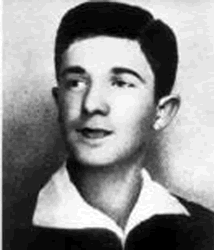
Mordechai Anielewicz
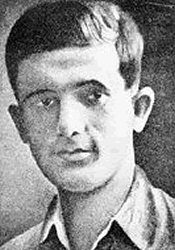
Mordechai Anielewicz
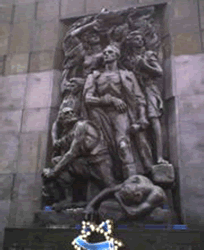
Mordechaj Anielewicz (with a hand grenade) in the center of the Monument to the Ghetto Heroes memorial in Warsaw
Mordechaj Anielewicz (1919 – May 8, 1943) was the commander of the Żydowska Organizacja Bojowa (English: Jewish Fighting Organization), also known as ŻOB, during the Warsaw Ghetto Uprising.
Born to a poor family in Wyszków near Warsaw, he joined and became a leader of the Zionist-socialist youth movement "Hashomer Hatzair" after he completed his high school studies. On September 7, 1939, a week after the German invasion of Poland, Anielewicz escaped with his members of the group from Warsaw to the eastern regions in the hopes that the Polish would slow down the German advance. When the Red Army finally occupied Eastern Poland, Anielewicz attempted to cross the Romanian border in order to open a route for young Jews to get to Mandatory Palestine; however, he was caught and thrown into a Soviet jail. He was released a short time later, and returned to the Warsaw Ghetto.
When he heard that Jewish refugees, other youth movement members and political groups flocked to Vilna, Lithuania, which was then under Soviet control, he went there too and convinced his colleagues to send people back to Poland to continue the fight against the Germans. He returned to Warsaw in January, 1940 with his girlfriend, Mira Fuchrer, where he organized cells and youngsters groups, instructed, participated in underground publications, organized meetings and seminars and visited other groups in different cities.
In the summer of 1942, Anielewicz was visiting the southwest region of Poland – annexed to Germany – attempting to organize armed resistance. Upon his return to Warsaw, he found that a major deportation to the Treblinka extermination camp had been carried out and only 60,000 of the ghetto's 350,000 Jews remained. He joined the ŻOB, and in November he was appointed as chief commander. In early 1943, a connection with the Polish government in exile in London was made and the group received weapons from the Polish underground on the "Aryan" side of the city.
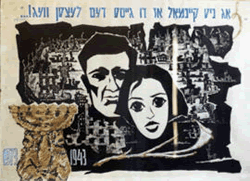
Mordechai Anielewicz and his girlfriend Mira Fuchrer in the ruined Warsaw ghetto. Painted by Shimon Garmize. Above the mural is the first line of the Partisan's Song "Zog Nit Keinmol" in Yiddish. "Zog Nit Keinmol" is shorthand for the phrase -- in English -- "Never Say You've Gone the Last Way/Path.
Mordechai Anielewicz and his girlfriend Mira Fuchrer in the ruined Warsaw ghetto. Painted by Shimon Garmize. Above the mural is the first line of the Partisan's Song "Zog Nit Keinmol" in Yiddish. "Zog Nit Keinmol" is shorthand for the phrase -- in English -- "Never Say You've Gone the Last Way/Path.
In January 18, 1943, he was instrumental in the first Warsaw ghetto uprising, preventing the majority of a second wave of Jews from being deported to extermination camps. This initial incident of armed resistance was a prelude to the Warsaw ghetto uprising that commenced on April 19 and fought the German troops until its suppression on May 16, 1943. Anielewicz died fighting, along with his girlfriend and many of his staff, in the ŻOB bunker at 18 Miła Street[1] on May 8, when the Germans overran their position. His body was never found, and it is generally believed that his body was carried off to nearby crematoriums along with all the other Jewish dead. In early 1944 he had been posthumously awarded the Virtuti Militari, the Polish military cross, by the Polish government in exile.
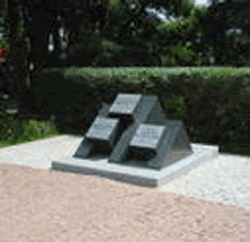
Mordechai Anielewicz's memorial in Wyszków
Kibbutz Yad Mordechai in Israel is named after him, and a monument was erected in his memory.
Cultural references
* Anielewicz is a key figure in Harry Turtledove's alternate history series Worldwar.
* Hank Azaria plays the role of Anielewicz in the 2001 TV movie Uprising.
* Anielewicz is also a character in Wraith: The Oblivion, the de-facto leader of the Shadowlands version of the Warsaw Ghetto and the Restless ZOB.
Further reading
Yitzhak ("Antek") Zuckerman, A Surplus of Memory : Chronicle of the Warsaw Ghetto Uprising (A Centennial Book), ISBN 0-520-07841-1.
External links
* Mordecai Anielewicz article from the Jewish Virtual Library.
* Mordecai Anielewicz article from the Grange Museum Warsaw Ghetto Website.
* Mordechai Anielewicz Biography at J-Grit: The Internet Index of Tough Jews
Biography - Mordechai Anielewicz, Hero of the Warsaw Ghetto Uprising
Mordechai Anielewicz was born n Wyszków near Warsaw, Poland, in1919 and died May 8, 1943. He was a hero and martyr of the Jewish Zionist resistance to Nazism and Fascism, leading the revolt of the Warsaw Ghetto, organizing and commanding the Żydowska Organizacja Bojowa (English: Jewish Fighting Organization), also known as ŻOB, during the Warsaw Ghetto Uprising.
Born to working class parents, he joined and became a leader in Hashomer Hatzair, a Zionist-socialist youth movement, after graduating high school. On September 7, 1939, a week after the German invasion of Poland, Anielewicz escaped with other members of Hashomer Hatzair from Warsaw to the eastern regions, hoping that the Poles would slow or stop the German advance. The Germans conquered Poland in less than three weeks, reaching a frontier pre-arranged with the Soviets. In accordance with the Molotov-Von Ribbentrop Pact, the Red Army occupied Eastern Poland. Anielewicz then tried to cross from Soviet occupied Poland into Romania to open a route for young Jews to escape into Romania and thence to Mandatory Palestine by Aliya Bet (illegal immigration). However, he was caught by the Soviets and thrown into jail. He was released a short time later.
Zionism: Mordechai Anielewicz - Zionist Hero of the Warsaw Ghetto uprising
Mordechai Anielewicz
Anielewicz traveled to Vilna, Lithuania, then under Soviet control, where many Polish members of Hashomer Hatzair and other groups had fled. He convinced some of them to return to Poland to continue the fight against the Germans. He returned to Warsaw in January, 1940 with his girlfriend, Mira Fuchrer. There he began to organize cells and groups of young people. He participated in underground publications, organized meetings and seminars and visited other groups in different cities.
The Germans however, forced all the Jews of Warsaw and surroundings into the tiny ghetto area and made it impossible for them to travel outside the ghetto for any reason. They then began deporting Jews. Rumors coming back to the Ghetto confirmed that the deportees were being sent to death camps and murdered. Certain death awaited all all the Jews of the Warsaw Ghetto, and in fact, of all of Europe. In that situation, the only desperate recourse was to organize armed resistance. This was impeded by the opposition of collaborationists, by the natural hope of those who did not want to hasten the end, and by infighting and organizational squabbles with anti-Zionist groups like the Bund. Above all, it proved difficult to obtain arms. The Polish underground, the main source of arms, was generally reluctant to help Jews, and allotted to them only a small number of pistols and small arms, exacting an exorbitant price for them.
In the summer of 1942, Anielewicz traveled to southwestern Poland, annexed to Germany, attempting to organize armed resistance. When he returned to Warsaw, he found that a major Aktion - deportation- to Treblinka extermination camp had taken most of the ghetto's 350,000 Jews, leaving only 60,000.
He joined the Jewish Military Organization. Hersh Berlinsky recorded a meeting of this organization in October 1942 and outlined some of the difficulties (Source: http://www1.yadvashem.org/about_holocaust/documents/part2/doc136.html
...At the end of October 1942 a meeting was held at the Ha-Shomer [Left-wing Zionist] Club in 61 Mila Street. Those present were: Ha-Shomer Mordecai [Anielewicz]; He-Halutz Yitzhak [Cukierman]; and Poalei Zion Smol [Left Labor Zionists] Pola [Elster], Berlinski, Wasser...agenda...the defense of the Warsaw ghetto. After an exhaustive discussion in which the following members took part Pola, Berlinski, Wasser, Mordecai and Yitzhak we reached a joint conclusion: (1) That the Jewish Fighting Organization has been established in order to prepare the defense of the Warsaw ghetto; (2) In order to teach a lesson to the Jewish Police, the Werkschutz,2* the managers of the "shops"3* and all kinds of informers. When we reached the issue of appointing the leadership, a touchy discussion developed. Should there be one authority or two: military, or military and political? The members of Ha-Shomer and He-Halutz strongly oppose twofold authority. Twofold authority will lead to arguments that will hamper the work. It will take us back to the days on the eve of the Destruction, when the parties argued and did nothing. The members of Ha-Shomer and He-Halutz speak with derision and scorn of the political parties. The parties have no right to interfere in our affairs. Apart from the youth, after all, they will do nothing. They will only get in the way. One single military leadership must be established, so we can start on the job.
The members of Poalei Zion Smol (pro-Soviet) point out the faulty assumption of Ha-Shomer and He-Halutz on what they term the death of honor: "We are fighting for our lives. If a few of us fall in battle we will not make a tragedy of it. Every war claims its victims. If the political parties made certain mistakes it is not you who are entitled to judge them. It was not you who led the political struggle and not you who will lead it in the future... One must not sanction irresponsible acts that are likely to bring about the liquidation of the Warsaw ghetto before its time. A group or organization that carries out weapon training contains within itself the aspiration and expectation of the happy moment when it will use these arms. We consider it to be an essential condition that a second authority be established which can judge clearly, from a political point of view, what the appropriate time is for the use of arms. Why are you so anxious, why are you so much afraid? Justice will always conquer. And even if we start out from the assumption that the ghetto will be destroyed and that we shall not be accountable to anyone for our actions, as a political party we declare that we are responsible for our actions before the Jewish masses in the world and before our comrades abroad. We do not want anybody to stone our graves because we advised irresponsible action. If you do not agree that the political parties will control the fighting organization then you are creating conditions for us that do not permit us to continue to take part...."
As soon as there is agreement on twofold authority, military and political, the foundation stone will have been laid for the joint Jewish Fighting Organization. We have decided to widen the area of our work and to draw the Bund closer to us....
Yad Vashem Archives, JM/2598.
1* Member of the military staff of the Jewish Fighting Organization.
2* Werkschutz the guard at places of employment and factories the "shops."
3* "Shop" Code name for a German enterprise, or an enterprise working by authority, and on behalf of the Germans.
In November, Anielewitz he was appointed chief commander of this organization. The organization had taken on new life, as it had been joined by all the Zionist groups, the communists and Gordonia. Another Jewish fighting organization, Zydowski Zwiazek Wojskowy (ZZW), a centrist group affiliated with the Polish Armia Krajowa, the underground army of the Polish government in exile in London, tried at first to get Jews to break out of the ghetto and join the Polish army in London.
In early 1943, ZOB managed to contact the Armia Krajowa and to obtain some arms. The Poles were reluctant to sell arms to Jews, and skeptical that they would use them. The commander wrote:
After all, Jews from all kinds of groups, including Communists, are turning to us and asking for arms as though our depots were full. By way of experiment I gave them a few revolvers. I have no assurance whatsoever that they will use these arms at all. I will not give them any more arms, because, as you know, we have none ourselves, we are waiting for a new consignment. Inform us what contacts our Jews have with London.
Kalina
Yad Vashem Archives, O-25/93.
* This message was sent by General Rowecki, Commander of the AK, to the Polish Government in London on January 4, 1943. AK Armia Krajowa Fatherland Army: the military arm of the Polish Underground under the orders of the Government-in-Exile in London.
Source: http://www1.yadvashem.org/about_holocaust/documents/part2/doc140.html
Actually, the arms were sold and not "given," apparently.
The fact that ZOB included leftist groups associated with the USSR did not help. ZOB got about 10 or 20 pistols, not all services and some other small arms in various shipments. Contacts were maintained through
In January 18, 1943, Anielewicz led an initial Warsaw ghetto uprising. It was sparked by a planned deportation. ZOB fighters infiltrated the columns of deportees. On signal, they began shooting and other violent resistance. The Germans "only" managed to deport about 5,000 Jews, and the ZOB considered this a "victory." It is not clear that the Germans had intended a larger deportation, but the success gained the attention of the remaining ghetto fighters and some support from the outside world.
Anielewicz and his fighters hid Jews in underground bunkers. On April 19, 1943, the final Nazi deportation began. The ZOB and ZZW began resistance, and managed to take a heavy toll of the Nazis. Nazi SS General Jurgen Stroop wrote:
The number of Jews brought out from the houses and held during the first few days was relatively small. It proved that the Jews were hiding in the sewer canals and in specially constructed bunkers. Where it had been assumed during the first days that there were only isolated bunkers, it proved in the course of the Grossaktion that the whole ghetto had been systematically provided with cellars, bunkers and passageways. The passages and bunkers all had access to the sewers. This enabled the Jews to move underground without interference. The Jews also used this network of sewers to escape underground into the Aryan part of the city of Warsaw. There were constant reports that Jews were attempting to escape through the sewer holes... How far the Jews' precautions had gone was demonstrated by many instances of bunkers skillfully laid out with accommodation for entire families, facilities for washing and bathing, toilets, storage bins for arms and ammunition, and large food reserves sufficient for several months. There were different bunkers for poor and for rich Jews. It was extremely difficult for the task forces to discover the individual bunkers owing to camouflage, and in many cases it was made possible only through betrayal on the part of the Jews.
After a few days it was already clear that the Jews would under no circumstances consider voluntary resettlement, but were determined to fight back by every means and with the weapons in their possession. Under Polish-Bolshevik leadership so-called fighting units were formed which were armed and paid any price asked for available arms....
...While at first it had been possible to capture the Jews, who are ordinarily cowards, in considerable numbers, the apprehending of the bandits** and Jews became increasingly difficult in the second half of the Grossaktion. Again and again, fighting units of 20 to 30 or more Jewish youths, 18 to 25 years old, accompanied by corresponding numbers of females, renewed the resistance. These fighting units were under orders to continue armed resistance to the end and, if necessary, to escape capture by suicide.
One such fighting unit succeeded in climbing out of the sewer through a manhole in so-called Prosta [Street] and to get on to a truck and escape with it (about 30 to 35 bandits)...
During the armed resistance females belonging to the fighting units were armed in the same way as the men; some were members of the He-Halutz Movement. It was no rarity for these females to fire pistols with both hands. It happened again and again that they kept pistols and hand-grenades (Polish "egg" grenades) hidden in their bloomers up to the last moment, in order to use them against the men of the Waffen-SS [military unit of the SS], Police and Wehrmacht.
Source: http://www1.yadvashem.org/about_holocaust/documents/part2/doc143.html
Mordechai Anielewicz's last letter
In his last letter, Anielewicz wrote:
April 23, 1943
It is impossible to put into words what we have been through. One thing is clear, what happened exceeded our boldest dreams. The Germans ran twice from the ghetto. One of our companies held out for 40 minutes and another for more than 6 hours. The mine set in the "brushmakers" area exploded. Several of our companies attacked the dispersing Germans. Our losses in manpower are minimal. That is also an achievement. Y. [Yechiel] fell. He fell a hero, at the machine-gun. I feel that great things are happening and what we dared do is of great, enormous importance....
Beginning from today we shall shift over to the partisan tactic. Three battle companies will move out tonight, with two tasks: reconnaissance and obtaining arms. Do you remember, short-range weapons are of no use to us. We use such weapons only rarely. What we need urgently: grenades, rifles, machine-guns and explosives.
It is impossible to describe the conditions under which the Jews of the ghetto are now living. Only a few will be able to hold out. The remainder will die sooner or later. Their fate is decided. In almost all the hiding places in which thousands are concealing themselves it is not possible to light a candle for lack of air.
With the aid of our radio we heard the marvelous report on our fighting by the "Shavit" radio station. The fact that we are remembered beyond the ghetto walls encourages us in our struggle. Peace go with you, my friend! Perhaps we may still meet again! The dream of my life has risen to become fact. Self-defense in the ghetto will have been a reality. Jewish armed resistance and revenge are facts. I have been a witness to the magnificent, heroic fighting of Jewish men in battle.
M. Anielewicz
Ghetto, April 23, 1943
[M. Kann], Na oczach swiata ("In the Eyes of the World"), Zamosc, 1932 [i.e., Warsaw, 1943], pp. 33-34.
* Written to Yitzhak Cukierman.
Source: http://www1.yadvashem.org/about_holocaust/documents/part2/doc145.html
Anielewicz's last letter became an inspiration to others.
Anielewicz his girlfriend and many of his comrades committed suicide in the bunker of the ŻOB at 18 Miła Street on May 8, 1943, when capture by the Germans became inevitable. His body was never found. It may have been carried off to nearby crematoria along with the other Jewish dead. In early 1944 he was posthumously awarded the Virtuti Militari, the Polish military cross, by the Polish government in exile.
Kibbutz Yad Mordechai in Israel is named for him, and a monument was erected in his memory.
The resistance and heroism of the Warsaw Ghetto revolt mark a tragic period in Jewish history and in the annals of the Zionist organization, which could do little to help itself and its members from inside Europe, and only slightly more from outside, though organization of revolts such as these, organization of parachutists to drop behind enemy lines and help Jews and allies, and organization of the illegal Aliya Bet immigration, as well as fighting in the Jewish Brigade.